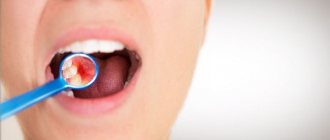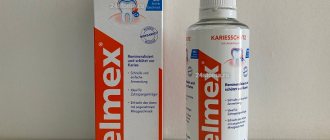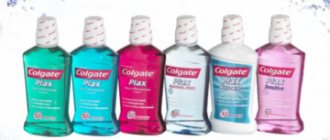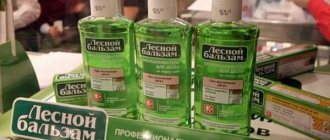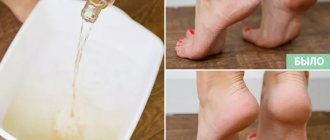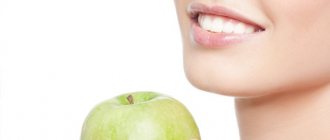Author of the article:
Soldatova Lyudmila Nikolaevna
Candidate of Medical Sciences, Professor of the Department of Clinical Dentistry of the St. Petersburg Medical and Social Institute, Chief Physician of the Alfa-Dent Dental Clinic, St. Petersburg
Oral hygiene is not only regular brushing of teeth in the morning and evening, but also the use of other means to remove bad breath and prevent dental diseases. One of these products is mouthwash. Previously, decoctions of medicinal plants were used in this capacity. Modern medicine offers complex, balanced compositions that have a targeted effect and provide the desired therapeutic or preventive effect.
Purpose of rinses for the mouth and gums
Dentists recommend using these products for:
- Keeping your breath fresh.
- For people who smoke, the components included in the product prevent yellowing of tooth enamel, and also reduce the destructive effect of nicotine and tar on tooth enamel.
- Reducing the effect of “staining” of the enamel as a result of frequent consumption of coffee, tea, wine and other drinks that affect the color of teeth.
- To reduce inflammation in the gums and reduce their bleeding.
- Reduced enamel sensitivity.
Also recommended for use:
- People who suffer from various oral diseases.
- Patients who have braces, dentures or any other structures in the oral cavity.
- After operations in the oral cavity (tooth extraction, installation of implants, etc.).
It must be taken into account that rinses are used as an aid to oral care. They should not be used as a substitute for brushing your teeth. The liquid product helps get rid of food particles and germs that cannot be removed during regular cleaning.
The best rinses with whitening effect
Another pressing problem that rinses help fight is plaque and yellowing of the enamel. Use solutions after every meal, drink, and cleansing paste. Among the variety of preventive and therapeutic liquids, VyborExpert identifies 3 leaders based on positive reviews from doctors and their patients.
Global White Whitening
This nominee is represented by a Russian brand that manufactures products according to European GMP and ISO standards.
The active formula consists of sodium perborate - an intracoronal bleach, a source of oxygen that penetrates into the enamel and dentin to remove dark pigment.
Sodium fluoride is a mineral component that prevents caries. Magnesium sulfate – strengthens the enamel, resulting in the formation of a film that repels plaque and stone.
Packaging: 300 ml transparent polymer bottle. Pleasant consistency and a refreshing mint taste and smell.
Advantages:
- General hygiene;
- Effective refreshment;
- Pleasant consistency;
- Prevention of stones, caries;
- Enamel protection;
- Package design.
Flaws:
- Does not whiten pronounced yellowness;
- Price.
Rinse your mouth with liquid for at least 15 seconds per procedure. Repeat it 2 times a day or more often as needed. In addition to oxygen bleaching, the drug treats sensitivity, prevents caries and stones.
Fluorodent (Avanta) Whitening
The product made it to the top list due to the fact that all products of the Fluorodent brand are the most budget-friendly option on our market. One bottle with a blue label contains 240 ml. It states that the composition excludes alcohol.
The solution performs several tasks - whitens enamel, protects against caries, freshens breath.
For ease of dosage, there is a plastic measuring cup with 15, 20, 25 ml divisions. The active ingredients are essential oils. Lemon has antibacterial properties, mint has capillary-strengthening and anti-inflammatory properties, clary sage has antiseptic, astringent properties, and anise has painkillers.
Advantages:
- Natural base;
- Whitening;
- Protection against caries;
- Suitable for sensitive enamel;
- Measuring cup;
- Cheap.
Flaws:
- Strong taste;
- More likely to prevent yellowness than to eliminate it.
Use the product after meals, drinking tea or coffee, as well as in the morning and evening in addition to brushing your teeth. Keep the liquid in your mouth for at least 30 seconds. Allowed from 6 years of age.
Lacalut White
Vyborexperta.ru is the latest to present a product from a popular German brand for consideration. It is intended for complex use together with paste and thread to increase their effectiveness.
The plastic bottle contains 300 ml of blue liquid without alcohol, there is a beaker dispenser.
The formula consists of several active components. Sodium fluoride protects teeth from caries, zinc chloride fights unpleasant odors, and eucalyptus oil acts as an antiseptic.
Pyrophosphate guarantees a whitening effect, cetylpyridinium chloride eliminates inflammation, thymol freshens breath.
Advantages:
- Effective whitening;
- Prevention of stone, plaque;
- Strengthening enamel;
- Protection against caries;
- Suppression of bacterial growth;
- Refreshment.
Flaws:
- Taste;
- Price.
The standard method of application is to keep 10 ml in your mouth for 30 seconds in the mornings and evenings. Also clean your mouth after every meal and drink that stains your enamel.
Composition of funds
The composition may include the following main components:
- Substances aimed at eliminating the risk of inflammation (antiseptics). These include: triclosan, chlorhexidine
- Fluorine compounds (sodium fluoride, etc.)
- Extracts from plants (extracts)
- Xylitol
- Ethanol
The components contained in each product may differ depending on the purpose for which a particular mouthwash is made. Ethyl alcohol is practically not used in modern rinses, since it can dry out the oral cavity.
Classification
The classification divides mouth products into two main groups:
- hygienic (cosmetic) - in fact, only masking the problem;
- medicinal - really eliminating it.
Hygienic ones include deodorizing mouth rinses - refreshing, eliminating unpleasant odor, and whitening - brightening tooth enamel.
Therapeutic rinses can be divided into:
- anti-caries;
- painkillers (anti-inflammatory);
- antibacterial;
- against gingivitis and plaque;
- against tartar;
- astringents.
Anti-caries products usually contain a lot of fluoride, which strengthens teeth well. They are often prescribed to those who wear braces.
Pain-relieving mouth rinses are designed to relieve acute pain associated with certain oral diseases. You can buy mouthwashes with this effect in pharmacies.
Antibacterial rinses destroy harmful microorganisms and keep gums healthy; they usually have a complex synthetic composition.
Rinses that are designed to prevent gingivitis and plaque act on bacteria, slowing their growth in the mouth. If the product contains antiseptics, for example, triclosan, then it is used only with a prescription.
Anti-tartar products contain calcium citrate.
Astringents constrict blood vessels, thereby reducing their sensitivity, and form a film on nerve endings, protecting them from inflammation.
Beneficial properties of mouth rinse
The use of a rinse is recommended for all people, even those with absolutely healthy teeth. Useful properties of the rinse aid:
- cleansing the surface of the teeth from plaque, which begins to form almost immediately after classical brushing with a toothbrush;
- protection against caries, help for sensitive teeth;
- elimination of unpleasant odor (its source is most often dental plaque);
- antibacterial effect of mouth rinse (prescribed after dental surgery to prevent infection);
- prevention of the formation of tartar, dissolution of the initial formations of hard plaque.
Even the most thorough brushing of your teeth with the right brush and the perfect toothpaste will not help get rid of the amount of bacteria that the mouthwash destroys.
How to use it correctly?
Recommendations for using the product:
- The amount of product must correspond to the recommended amount. Information on the required dosage can be found in the package insert or on the cap of the rinse aid. Some manufacturers of products provide special dispensers that do not allow the use of liquid in excess of the norm.
- The product must be diluted if this is stated in the instructions.
- Mouthwash is usually used after daily brushing of teeth. More frequent use is possible only after consultation with your doctor.
- The rinsing time is from 20 seconds to a minute.
- The product should not be swallowed.
- It is not recommended to consume food or liquid for half an hour after the procedure.
- For young children, it is advisable to purchase products that are suitable for their age.
Precautions for use
Before purchasing the product, you should consult with your doctor, since, in addition to the obvious benefits, there are several negative factors associated with its use:
- Change in taste sensations.
- Darkening or change in the natural color of tooth enamel as a result of prolonged use of mouthwash.
- If the product contains ethanol (ethyl alcohol), its use is hazardous to health (since there is a possibility of accidental ingestion of the liquid).
Do not forget about the individual intolerance of the body to some components. It is recommended to carefully study the composition before using the product so as not to cause harm to health. The most common side effects when using mouthwash:
- Burning in the mouth.
- Nausea.
- Diarrhea.
- Dry mouth.
- The appearance of seizures.
- Blueness of fingertips.
- The appearance of an inflammatory process in the lymph nodes.
- Dizziness.
- Blue lips.
- Excessive thirst.
- Impaired coordination of movements.
- Difficulty breathing, etc.
If at least one of the above symptoms appears, you should stop using the drug and consult your doctor. If the product is used as prescribed by a doctor, the risk of side effects is minimal.
The best anti-caries mouth rinses
PresiDENT Classic Plus
Rating: 4.8
This product provides excellent protection against caries. According to reviews, after use the teeth become less sensitive. It's all about the effect that the rinse aid has. It affects the enamel, mineralizing it. In addition, it promotes the destruction of tartar and resists the formation of plaque.
PresiDENT Classic Plus also provides excellent protection against gum irritation. According to reviews, fresh breath lasts for a long time. This result is ensured by the composition: natural ingredients in the form of extracts of chamomile, sage and refreshing lemon balm. An advantage is the possibility of using the solution for an irrigator if it is diluted 1 to 3. It penetrates into the most inaccessible places, providing maximum comfort from use.
Advantages
- protection against tartar and caries;
- resists inflammation;
- long freshness.
- there is no alcohol in the composition.
Flaws
- more expensive than some rinses, but this is justified by the cost-effectiveness of the product.
Elmex Protection against caries
Rating: 4.7
A worthy place in the ranking is occupied by Elmex “Protection against caries”. It is interesting that the rinse does not have any noticeable tastes, but it leaves freshness after use and lasts for about an hour. Users rated Elmex based on its properties. After regular use, tooth enamel is protected thanks to a special component - amino fluoride. This substance creates an invisible film that protects teeth from destruction.
There are no antiseptic components in the composition. Therefore, the liquid is suitable for long-term use. And the absence of alcohol makes it accessible to children, albeit after 6 years.
Advantages
- resists the appearance of caries;
- creates a special film on the enamel that protects against destruction;
- has a safe composition.
Flaws
- short-lived and weak feeling of freshness.
Mouthwash: is it necessary and who should use it?
Today, rinsing liquids are not very popular. However, the question of whether modern man needs them should be answered in the affirmative. After all, it is very important to maintain a healthy oral cavity, preventing the proliferation of pathogenic bacteria.
In case of weak gums, their tendency to bleeding and inflammation, chronic diseases and when recovering from surgery, the use of gum rinses is simply necessary. Such products contain substances to relieve inflammation and quickly heal gum tissue, strengthen and reduce bleeding.
If you have very sensitive teeth, it is also worth using a mouthwash regularly. There are products specifically designed for teeth that react painfully to hot and cold foods and drinks. They not only strengthen tooth enamel, but also create a protective film that lowers the sensitivity threshold and also protects teeth from cervical caries.
Using mouthwash during pregnancy will help many expectant mothers keep their teeth intact and healthy. Indeed, during this period, bleeding gums, increased sensitivity of teeth, and damage due to a lack of vitamins and minerals may appear. Therefore, it is especially important to monitor oral hygiene. Special compounds create a protective film, preventing the destruction of tooth enamel.
Choosing the best mouthwash for teeth and gums
Modern rinses are available in the form of ready-made solutions, liquid concentrates, or in the form of powders that must be diluted with water. They can be hygienic for refreshing the oral cavity and therapeutic and prophylactic against caries, inflammation, bleeding gums and for strengthening tooth enamel.
For daily use, you should choose a liquid without an antibacterial component in the composition. A gum rinse with an antibacterial component (triclosan, chlorhexidine) helps with acute inflammation (ulcers, gum inflammation, aphthae). But it is worth considering that it cannot be used for more than 7 days in a row, because the native microflora of the oral cavity begins to die, it is replaced by pathogenic bacteria that produce resistance factors to triclosan and chlorhexidine, and become the enemy of your body. Dry mucous membranes and increased tissue irritability may appear.
You also need to pay attention to the fluoride content: with a content of no more than 0.05%, the liquid can be used daily without harm. If the fluoride concentration is 0.2% or higher, dentists advise using this rinse no more than 1-2 times a week.
The product for sensitive teeth that react to cold and hot should not contain alcohol. Ethyl alcohol can negatively affect the condition of the oral mucosa. Motorists should also note that such a mouthwash can give a positive result on a breathalyzer, although the normal level of ethyl alcohol in the breath returns within 10 minutes after rinsing the mouth.
It is worth saying that the color of the liquid does not affect the change in the color of tooth enamel, that is, staining does not occur even after prolonged use of the mouthwash. Therefore, when choosing a rinse aid, you do not need to focus on the color of the solution.
When choosing an oral fluid, pay attention to criteria such as:
- clinically proven effectiveness;
- products are approved by the Russian Dental Association.
For example, Asepta® brand mouth rinses meet these criteria. The line of products includes two combined-action rinses - the hygienic Asepta® Fresh and the therapeutic and preventive Asepta® Active.
Mouthwash "Asepta® Active" is intended for use in infectious and inflammatory diseases of the oral cavity. It has an antibacterial effect, relieves inflammation and bleeding of gums due to gingivitis and periodontitis, prevents the formation of dental plaque and freshens breath. The liquid also has an analgesic effect, since it contains an analgesic - benzydamine, therefore it is indicated for toothache.
Asepta® Fresh mouthwash does not contain alcohol or antiseptics and is recommended for daily preventive protection and maintaining healthy gums and teeth. The product reduces the increased sensitivity of teeth and gums, prevents the formation of tartar and caries.
Mouthwash for bleeding gums
When bleeding gums, rinses with plant extracts help well. Extracts of plants such as chamomile, sage, lemon balm, St. John's wort, oak bark have a pronounced healing effect, help cope with bleeding and strengthen gums, and have a wound healing effect. Chamomile improves blood circulation and has a positive effect on blood vessels, preventing bleeding.
Plant extracts also help achieve fresh breath.
Mouthwash for gum inflammation
Anti-inflammatory rinses contain components such as plant essential oils, antiseptics, and antioxidants. Chlorhexidine is a broad-spectrum antiseptic, most often used in anti-inflammatory rinses. As mentioned above, the course of use of such rinses is limited and must be agreed with a doctor so as not to upset the balance of the oral microflora.
The rinse may also contain betamethasone as an anti-inflammatory component.
Mouthwash against caries
Anti-caries agents contain minerals (fluorine, calcium), which are aimed at strengthening tooth enamel and preventing caries. Fluoride rinses are suitable for daily use as long as the fluoride concentration is low. The British Dental Association recommends the use of fluoridated rinses as an addition to brushing with fluoridated toothpastes, which provide a higher level of protection than using toothpaste alone.
How to use mouthwash for oral hygiene?
Rinsing with mouthwash should be done at least twice a day, after brushing and flossing your teeth. It is recommended to use the rinse also after meals during the day as an independent means of oral hygiene.
Many mouthwash bottles have a special dispenser cap that holds approximately 4 teaspoons of product, which is equal to 20 g of liquid. If there is no measuring cap, a dose equivalent to 20 g of liquid is used.
To achieve the effect, you need to rinse your mouth with the liquid for at least 20 seconds. Dentists recommend rinsing your mouth dynamically, as if filtering the liquid through your teeth. The liquid is then spat out. After the procedure, it is advisable to refrain from eating and drinking for half an hour to allow the healing, antiseptic and mineralizing components to take effect.
Rinse aids are not intended to be diluted with water or mixed with other products.
If you experience a burning sensation in your mucous membranes when using a mouthwash, you should choose another oral hygiene product.
Let's summarize: using mouthwash for daily oral hygiene is not only possible, but also necessary. For daily use, a product without an antibacterial component and with a low fluoride content is suitable. By regularly using mouth rinse as the final stage of hygiene, you will ensure reliable protection of your teeth from plaque and caries, and gums from inflammatory diseases, and avoid bad breath.
May your teeth be healthy!
Rinse aids "ASEPTA"
Typically, manufacturers of rinses produce them in specialized series, each product is “responsible” for the treatment (prevention) of a specific disease (or diseases that are closely related to each other). For example, Asepta Fresh mouthwash helps get rid of unpleasant odors thanks to the antibacterial effect of plant extracts and mint with lime. You can buy mouthwash in regular pharmacies and stores, large supermarkets, online pharmacies and online stores.
Asepta Fresh mouthwash is made from natural plant ingredients:
- Lime and mint provide pleasant flavor profiles.
- Potassium and sodium remove plaque and tartar.
- Extracts of witch hazel, sage and chamomile provide antimicrobial and anti-inflammatory effects.
- Xylitol protects tooth enamel.
- Potassium citrate reduces the sensitivity of enamel.
Characteristics of Asept Fresh and its effects:
- Protects teeth and gums from plaque.
- Has a calming effect.
- Prevents the occurrence and development of carious formations in the oral cavity.
- Preserves the natural whiteness of tooth enamel.
- Provides fresh breath for a long period.
- Prevents gum inflammation and reduces bleeding.
- The product does not contain components such as alcohol and dyes.
- It can be used for an unlimited amount of time.
- Has no contraindications.
Taking into account the peculiarities of the action of various rinses, dentists recommend using not one, but several products - either alternating them or using them in combination. Since these products play a supporting role, they are usually matched with appropriate toothpastes. Complex influence is much more effective.
Regular use of properly selected rinses is not only an attractive appearance of the oral cavity, but also the health of teeth and gums.
Cons of mouthwashes
- For the mouthwash to work
, you need to rinse your mouth not for 10 seconds, as most people do, but for 30–40 seconds. At first it’s not easy: out of habit, the facial muscles quickly get tired. But with daily rinsing, they become trained. - Mouthwashes should not be swallowed
, even those that say they are harmless on the packaging. Most products contain ethanol. It effectively fights bacteria, but if accidentally swallowed it can cause dysbacteriosis. In addition, within 10-15 minutes after rinsing, the alcohol test gives a positive result: take this into account if you drive a car. - Cheap rinses eliminate symptoms
, not causes, as they consist of water and herbal infusions or green tea. They simply dull bad breath, but do not eliminate the cause of its occurrence. - Some rinses contain synthetic dyes
(CI 42090, CI 19140, CI 17200), preservatives and foaming agents that cause dry mucous membranes and can even stain the enamel. - Rinses containing chlorhexidine can cause inflammation
and dryness of the mucous membranes. Such drugs are contraindicated for children. - Rinses containing the foaming agent Sodium Lauryl Sulfate (SLS) also cause dry mucous membranes
and neutralize the effect of chlorhexidine.
Clinical researches
ASEPTA rinses are clinically proven effective. For example, repeated clinical studies have proven that the two-component oral product ASEPTA ACTIVE more effectively combats the causes of inflammation and bleeding compared to single-component rinses - it reduces inflammation by 41% and reduces bleeding gums by 43%.
Sources:
- The role of anti-inflammatory rinse in the treatment of periodontal diseases (L.Yu. Orekhova, A.A. Leontyev, S.B. Ulitovsky) L.Yu. OREKHOVA, Doctor of Medical Sciences, Prof., Head of Department; A.A. LEONTIEV, dentist; S.B. ULITOVSKY, Doctor of Medical Sciences, Prof. Department of Therapeutic Dentistry of St. Petersburg State Medical University named after. acad. I. P. Pavlova
- Report on determining/confirming the preventive properties of commercially produced personal oral hygiene products: Asepta toothpaste used in combination with Asepta mouthwash and Asepta gum balm Head. Department of PFS Doctor of Medical Sciences Professor S.B. Ulitovsky St. Petersburg State Medical University named after Academician I.P. Pavlova. Faculty of Dentistry. Department of Preventive Dentistry.
How to choose a rinse aid?
When choosing mouth rinses, you need to start from your needs. This can be either a solution to certain dental problems or comprehensive prevention.
The LISTERINE® line of products for gums and teeth allows everyone to choose the most suitable mouthwash option to prevent and eliminate major dental problems.
For preventive purposes, you can use “Fresh Mint” or TOTAL CARE rinses for gums and teeth. Daily use of these rinses helps reduce the number of harmful bacteria, prevent plaque formation in hard-to-reach places, and strengthen gums and enamel. For rinsing gums and teeth, products have been developed that are aimed at combating certain oral problems: bleeding and inflammation of the gums, darkening of teeth, etc. You can learn more about the rules for choosing a mouth rinse in the material “How to choose a rinse?” 1 In vitro studies using model of oral biofilms have shown that Listerine can reduce the viability of plaque biofilm by up to 99% compared to a water control. Reduces up to 99% of plaque (or plaque forming) bacteria in lab tests. Internal reports for studies by Minoli G., October 3, 2008 (mixed species biofilm flow through assay performed from Sept. 30, 2008 through Oct. 3, 2008) and by Ilg D et al, Febriary 20, 2009 (mixed species biofilm flow through assay performed from February 16, 2009 to February 20, 2009). 2 Compared to using fluoride toothpaste. 3 Compared to mechanical cleaning without using rinse aid. 4 Data on File (Clinical), OCT 2013. The result may vary in each individual case.

